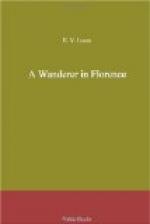Crabb Robinson, the friend of so many men of genius, who was in Florence in 1880, in rooms at 1341 Via della Nuova Vigna, met Landor frequently at his villa and has left his impressions. Landor had made up his mind to live and die in Italy, but hated the Italians. He would rather, he said, follow his daughter to the grave than to her wedding with an Italian husband. Talking on art, he said he preferred John of Bologna to Michelangelo, a statement he repeated to Emerson, but afterwards, I believe, recanted. He said also to Robinson that he would not give 1000 Pounds for Raphael’s “Transfiguration,” but ten times that sum for Fra Bartolommeo’s picture of S. Mark in the Pitti. Next to Raphael and Fra Bartolommeo he loved Perugino.
Landor soon became quite the husbandman. Writing to his sisters in 1831, he says: “I have planted 200 cypresses, 600 vines, 400 roses, 200 arbutuses, and 70 bays, besides laurustinas, etc., etc., and 60 fruit trees of the best qualities from France. I have not had a moment’s illness since I resided here, nor have the children. My wife runs after colds; it would be strange if she did not take them; but she has taken none here; hers are all from Florence. I have the best water, the best air, and the best oil in the world. They speak highly of the wine too; but here I doubt. In fact, I hate wine, unless hock or claret....
“Italy is a fine climate, but Swansea better. That however is the only spot in Great Britain where we have warmth without wet. Still, Italy is the country I would live in.... In two [years] I hope to have a hundred good peaches every day at table during two months: at present I have had as many bad ones. My land is said to produce the best figs in Tuscany; I have usually six or seven bushels of them.”
I have walked through Lander’s little paradise—now called the Villa Landor and reached by the narrow rugged road to the right just below the village of S. Domenico. Its cypresses, planted, as I imagine, by Lander’s own hand, are stately as minarets and its lawn is as green and soft as that of an Oxford college. The orchard, in April, was a mass of blossom. Thrushes sang in the evergreens and the first swallow of the year darted through the cypresses just as we reached the gates. It is truly a poet’s house and garden.
In 1833 a French neighbour accused Landor of robbing him of water by stopping an underground stream, and Landor naturally challenged him to a duel. The meeting was avoided through the tact of Lander’s second, the English consul at Florence, and the two men became friends. At his villa Landor wrote much of his best prose—the “Pentameron,” “Pericles and Aspasia” and the “Trial of Shakespeare for Deer-stealing “—and he was in the main happy, having so much planting and harvesting to do, his children to play with, and now and then a visitor. In the main too he managed very well with the country people, but one day was amused to overhear a conversation over the hedge between two passing contadini. “All the English are mad,” said one, “but as for this one...!” There was a story of Landor current in Florence in those days which depicted him, furious with a spoiled dish, throwing his cook out of the window, and then, realizing where he would fall, exclaiming in an agony, “Good God, I forgot the violets!”




